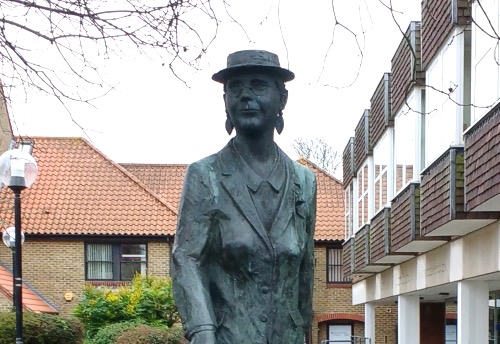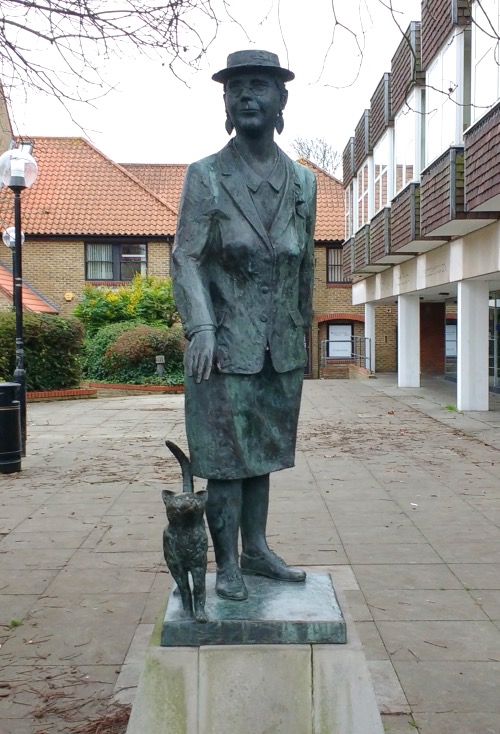
JO KADLECEK says Sayers’ voice was that of a “craftsman committed to excellence and truth”…
Sydney, Australia
A week before Christmas in 1941, families across England huddled in close to their upright radios. Pearl Harbor had been bombed just weeks before. German air raids had descended on England for months with no signs of letting up. By 19th December, 1941, Hitler had unleashed one of the most horrific attacks in human history.
But on 21st December, 1941, families and neighbours in England gathered around their radios not to listen to updates of the war. Instead, they tuned in to hear a dramatic program from the British Broadcasting Corporation: the story of a baby in Bethlehem, born outside a “shepherd’s cottage”. They heard wise men with cockney accents, and a king as evil as Hitler. Herod was his name.

Bronze statue of Dorothy L Sayers, by John Doubleday, on Newland Street, Witham, England, where Sayers’ lived from the 1930s until her death in 1957. PICTURE: GeneralJohnsonJameson/Public Domain (imaged lightened)
“[T]wo million people listened to Sayers’ drama, against the backdrop of wartime raids and food rations. They responded with hundreds of letters to the BBC. Many admitted that The Man Born to Be King had shocked them, challenged them and changed everything they’d ever known about Jesus.”
From that December night until October of the next year, the BBC aired 11 more 30 minute episodes of these radio plays on the life of Christ, written in modern dialect and delivered by a cast of English radio actors.
Two years before, the BBC had commissioned Dorothy L Sayers, a mystery-writer-turned dramatist and essayist, to write the series of plays on “the Life of Our Lord” for broadcasting during the Sunday Children’s Hour. The director of religious broadcasting for the BBC, JW Welch, felt such radio dramas were necessary because the “dimension we call ‘God’ had largely vanished from their [listeners] lives; God was no longer a factor to be reckoned with in making decisions and the language of religion had lost most; everywhere was a great ignorance of Christian Faith.”
Though Welch was convinced of the plays’ importance for a country at war, he wondered how – and if – the series could, “for man today and in the language of today, make Christ and his story live again?”
Sayers agreed to try. She wrote the plays on the condition she could “introduce the character of Our Lord” with the same realism she had in her other writing and in speech that all could understand. Welch was ecstatic and The Man Born to Be King was broadcast in every town throughout England, repeated again the following years.
As a result, two million people listened to Sayers’ drama, against the backdrop of wartime raids and food rations. They responded with hundreds of letters to the BBC. Many admitted that The Man Born to Be King had shocked them, challenged them and changed everything they’d ever known about Jesus. One man wrote, “I will truthfully state that I learnt more about my religion in half an hour today than I ever did in the years of Sunday School.” Another wrote, “Your play is quite changing the atmosphere in our house, and where there has been resentment and criticism, we can feel it dying away in the presence of Christ.”
The risk Welch and the BBC had taken to commission and produce the plays proved worth the effort. Welch believed, “Miss Sayers has put the Christian Church in this country in their debt by making Our Lord – in her fine phrase – ‘really real’ for so many of us.”
For factory workers and businessmen, ministers, soldiers and school-teachers, all enduring the horrors of World War II, Sayers’ on-air proclamation of Christ’s ministry, death and resurrection renewed a country’s hope. Even CS Lewis, a long-time friend of Sayers, returned to the plays each year as his Lenten reading.
Of course, Sayers hadn’t grown up expecting to write radio plays about Jesus that would reach her nation. Born in 1893, she was the only child of an Anglican vicar yet maintained a faith she knew was relevant in any time period. Christ was “really real” to Dorothy. She excelled in her craft as a writer, believing it to be what she was born for, and soon became known as an astonishingly creative wordsmith, one of the first women to graduate from Oxford.
We rely on our readers to fund Sight's work - become a financial supporter today!
For more information, head to our Subscriber's page.
She got her start in publishing as a poet before working as an advertising writer – we can thank Sayers for the ads, “Drink Guinness. It’s good for you” – both of which shaped her style for the Lord Peter Wimsey detective novels. Her first, Whose Body?, was published in 1923 and 10 more followed along with a number of short stories featuring Wimsey.
The novels secured her fame (and income) until she turned her attention to “more important work”: writing religious plays and reading essays on religion for the BBC. Soon Lewis challenged her to begin publishing her essays in books like Creed or Chaos?, Unpopular Opinions and The Other Six Deadly Sins. Her seminal book, The Mind of the Maker as well as her essays, “Why Work?” and “Are Women Human?” are today used in faith and vocation studies in churches, ministries and universities, and various aspects of her theology and writing remain the focus of countless dissertations and studies.
Sayers spent her final years studying and translating Dante and was halfway finished when in 1957, she fell down her stairs and died from a heart attack. But the impact she had as a woman writing in a male-dominated literary world and culture, as well as her clarity as a public apologist for the Christian faith, have continued to influence writers, readers and theologians around the world.
Gender aside, hers was the voice of a craftsman committed to excellence and truth, because as Sayers herself wrote (in Why Work?) the “only Christian work is good work well done”.
Jo Kadlecek is a writer living just north of Sydney on the Central Coast of New South Wales, Australia, and has helped produce three live dramatisations of the first play in ‘The Man Born to be King’ series at local churches for Christmas celebrations. Part of this essay is excerpted from her book, A Desperate Faith: Lessons of Hope from the Resurrection.
This article contains affiliate links.






